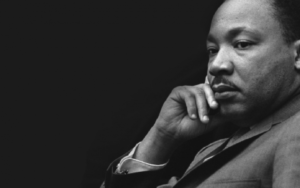
As we celebrate Martin Luther King, Jr., Day for the 35th year, the ominous social climate that we face today seems all to parallel to the plight that King faced in his day.
Those devoted to preserving white supremacy have made their presence known in an undeniable way as we’ve barely broken through the first month of this year. More dangerous however, is the white moderate that minimizes the behavior of the unjust and urges the compliance of Black and other minority raced individuals crying out for justice.
King’s “Letter from a Birmingham Jail,” written in 1963 is a traditional reading for me on this holiday. As King defends his nonviolent actions from his fellow clergymen that label his activities as “unwise and untimely,” I think of how the character of the white moderate has been preserved and passed down for generations, as today there are calls for a false peace and an illegitimate sense of unity.
Even worse is the belief that if we merely stop complaining about the plate of injustice that we’ve been served in this nation, it will inevitably all go away in due time. But King was clear in his letter that the attitude of the white moderate is complicit with the status quo and unhelpful to initiating a social movement heading in the direction of equality.
“Shallow understanding from people of good will is more frustrating than absolute misunderstanding from people of ill will,” King said. “Lukewarm acceptance is much more bewildering than outright rejection.”
So while cliches such as “I see you, I hear you and I stand with you,” may temporarily give the sensation of warmness and togetherness, they ultimately mean nothing if there is no action behind the words to create true unity. My fear is that those who aren’t oppressed by our system are in such a big hurry to get back to “normal,” that they are unaware of how inequitable and unjust the norm has been for Black individuals in this nation.
We will never be able to usher in true unity in this nation if we continually slam the door on justice. Justice is the hurdle we must jump, to get to the finish line of unity.
In 1999 Gallup released a list of the most admired individuals of the 20th century, the same year the verdict of King v. Jowers was delivered, finding Jowers and unspecified government agencies guilty of King’s assassination. With King ranking number two, just below Mother Teresa 30 years after he was murdered, it’s worth wondering how he went from being persecuted to being publicly admired.
In 1966, just two years before he was murdered, the last Gallup measure of King while he was alive found that the public’s perception of him was 63% negative. Only through the magnification of his less controversial quotes did white moderates morph King into a figure that was more concerned with peace and unity than justice.
Which is why the white moderate’s overwhelming response to the protests of the past year against racial inequality has been rhetoric such as “MLK wouldn’t approve of this,” or “I believe you can protest but not like that.” It’s quite easy to misconstrue the words of a man who was murdered and therefore can’t defend himself presently.
But King’s “Letter from a Birmingham Jail,” is certainly clear in that he hoped that all would look at the state of our nation and act to create true unity.
“I had hoped that the white moderate would see this need. Perhaps I was too optimistic; perhaps I expected too much.”